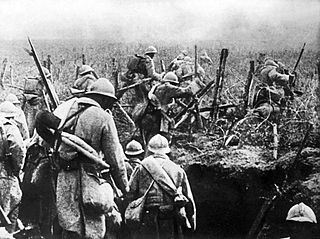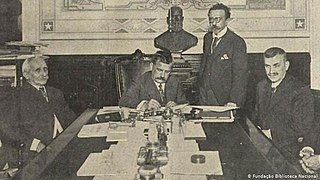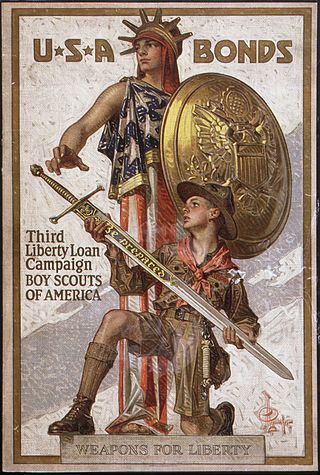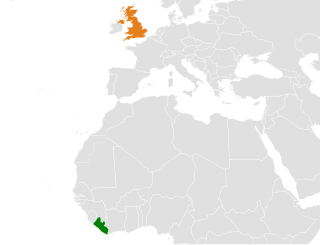Related Research Articles

Following their defeat in World War I, the Central Powers agreed to pay war reparations to the Allied Powers. Each defeated power was required to make payments in either cash or kind. Because of the financial situation in Austria, Hungary, and Turkey after the war, few to no reparations were paid and the requirements for reparations were cancelled. Bulgaria, having paid only a fraction of what was required, saw its reparation figure reduced and then cancelled. Historians have recognized the German requirement to pay reparations as the "chief battleground of the post-war era" and "the focus of the power struggle between France and Germany over whether the Versailles Treaty was to be enforced or revised."

The Zimmermann Telegram was a secret diplomatic communication issued from the German Foreign Office in January 1917 that proposed a military contract between the German Empire and Mexico if the United States entered World War I against Germany. With Germany's aid, Mexico would recover Texas, Arizona, and New Mexico. The telegram was intercepted by British intelligence.

Daniel Edward Howard was the 16th president of Liberia, serving from 1912 to 1920.

The Allied intervention in the Russian Civil War consisted of a series of multi-national military expeditions that began in 1918. The initial impetus behind the interventions was to secure munitions and supply depots from falling into the German Empire's hands, particularly after the Bolsheviks signed the Treaty of Brest-Litovsk, and to rescue the Allied forces that had become trapped within Russia after the 1917 October Revolution. After the Armistice of 11 November 1918, the Allied plan changed to helping the White forces in the Russian Civil War. After the Whites collapsed, the Allies withdrew their forces from Russia by 1925.

The Allies, or the Entente, were an international military coalition of countries led by France, the United Kingdom, Russia, the United States, Italy, and Japan against the Central Powers of Germany, Austria-Hungary, the Ottoman Empire, and Bulgaria in World War I (1914–1918).

World War I or the First World War was a global conflict between two coalitions: the Allies and the Central Powers. Fighting took place mainly in Europe and the Middle East, as well as parts of Africa and the Asia-Pacific, and was characterised by trench warfare and the use of artillery, machine guns, and chemical weapons (gas). World War I was one of the deadliest conflicts in history, resulting in an estimated 9 million military dead and 23 million wounded, plus up to 8 million civilian deaths from causes including genocide. The movement of large numbers of troops and civilians was a major factor in spreading the Spanish flu pandemic.

Woodrow Wilson's tenure as the 28th president of the United States lasted from March 4, 1913, until March 4, 1921. He was largely incapacitated the last year and a half. He became president after winning the 1912 election. Wilson was a Democrat who previously served as governor of New Jersey. He gained a large majority in the electoral vote and a 42% plurality of the popular vote in a four-candidate field. Wilson was re-elected in 1916 by a narrow margin. Despite his New Jersey base, most Southern leaders worked with him as a fellow Southerner.

Deutschland was a blockade-breaking German merchant submarine used during World War I. It was developed with private funds and operated by the North German Lloyd Line. She was the first of seven U-151-class U-boats built and one of only two used as unarmed cargo submarines.
The following outline is provided as an overview of and topical guide to World War I:

The U-1 class was a class of two submarines or U-boats built for and operated by the Austro-Hungarian Navy. The class comprised U-1 and U-2. The boats were built to an American design at the Pola Navy Yard after domestic design proposals failed to impress the Navy. Constructed between 1907 and 1909, the class was a part of the Austro-Hungarian Navy's efforts to competitively evaluate three foreign submarine designs.

SM U-1 or U-I was the lead boat of the U-1-class of submarines or U-boats built for and operated by the Austro-Hungarian Navy. U-1 was designed by American naval architect Simon Lake of the Lake Torpedo Boat Company, and constructed at the Navy Yard in Pola. She was one of two Lake-designed submarines purchased as part of a competitive evaluation of foreign submarine designs after domestic proposals were rejected by the Navy.

During World War I (1914–1918), Brazil initially adopted a neutral position. They did this in accordance with the Hague Convention, in an attempt to maintain markets for its export products, those being mainly coffee, latex and industrially manufactured items.

The U-boat campaign from 1914 to 1918 was the World War I naval campaign fought by German U-boats against the trade routes of the Allies. It took place largely in the seas around the British Isles and in the Mediterranean. The German Empire relied on imports for food and domestic food production and the United Kingdom relied heavily on imports to feed its population, and both required raw materials to supply their war industry; the powers aimed, therefore, to blockade one another. The British had the Royal Navy which was superior in numbers and could operate on most of the world's oceans because of the British Empire, whereas the Imperial German Navy surface fleet was mainly restricted to the German Bight, and used commerce raiders and submarine warfare to operate elsewhere.

During World War I, the United States saw a systematic mobilization of the country's entire population and economy to produce the soldiers, food supplies, ammunitions and money necessary to win the war. Although the United States entered the war in April 1917, there had been very little planning, or even recognition of the problems that Great Britain and the other Allies had to solve on their own home fronts. As a result, the level of confusion was high in the first 12 months.

The United States declared war on the German Empire on April 6, 1917, nearly three years after World War I started. A ceasefire and armistice were declared on November 11, 1918. Before entering the war, the U.S. had remained neutral, though it had been an important supplier to the United Kingdom, France, and the other powers of the Allies of World War I.

The economic history of World War I covers the methods used by the First World War (1914–1918), as well as related postwar issues such as war debts and reparations. It also covers the economic mobilization of labour, industry, and agriculture leading to economic failure. It deals with economic warfare such as the blockade of Germany, and with some issues closely related to the economy, such as military issues of transportation. For a broader perspective see home front during World War I.

Sweden, following its long-standing policy of neutrality since the Napoleonic Wars, remained neutral throughout World War I between 28 July 1914 and 11 November 1918. However, this neutrality was not maintained without difficulty and Sweden at various times sympathised with different parties in the conflict.
The diplomatic history of World War I covers the non-military interactions among the major players during World War I. For the domestic histories of participants see home front during World War I. For a longer-term perspective see international relations (1814–1919) and causes of World War I. For the following (post-war) era see international relations (1919–1939). The major "Allies" grouping included Great Britain and its empire, France, Russia, Italy and the United States. Opposing the Allies, the major Central Powers included Germany, Austria-Hungary, the Ottoman Empire (Turkey) and Bulgaria. Other countries also joined the Allies. For a detailed chronology see timeline of World War I.

Liberia–United Kingdom relations refer to the bilateral relations between Liberia and the United Kingdom. The United Kingdom was the first country to recognize Liberian independence. Liberia has a history of border disputes with the British Colony of Sierra Leone, as well as cumbersome British loans which have at times compromised Liberian sovereignty.

After Liberian independence, Germany and Liberia become connected economically. The economic ties were broken during the World Wars. The two countries re-established connections following the World Wars.
References
- 1 2 3 4 Spencer C. Tucker; Priscilla Mary Roberts (September 2005). Encyclopedia Of World War I: A Political, Social, And Military History. ABC-CLIO. pp. 689–. ISBN 978-1-85109-420-2.
- ↑ Robert Kappel; Werner Korte; R. Friedegund Mascher (1986). Liberia: Underdevelopment and Political Rule in a Peripheral Society. Institut für Afrika-Kunde. p. 134. ISBN 978-3-923519-65-1.
- ↑ First World War http://www.firstworldwar.com/1917_08_07.htm . Retrieved 7 August 2017.
{{cite web}}: Missing or empty|title=(help)[ dead link ] - ↑ Pope, Stephen; Wheal, Elizabeth-Anne (2007). Dictionary of the First World War. Pen and Sword. ISBN 9780850529791 . Retrieved 27 August 2018.
- ↑ Thomas Duval Roberts (1972). Area Handbook for Liberia. U.S. Government Printing Office.
- ↑ Trudy Ring; Noelle Watson; Paul Schellinger (5 March 2014). Middle East and Africa: International Dictionary of Historic Places. Routledge. pp. 520–. ISBN 978-1-134-25986-1.
- ↑ Liberia. Intercontinental Books. 1952. pp. 64–. GGKEY:48KHQXGN8WR.
- ↑ The Crisis Publishing Company, Inc. (November–December 2003). "The Crisis". The New Crisis. The Crisis Publishing Company, Inc.: 22–. ISSN 0011-1422.